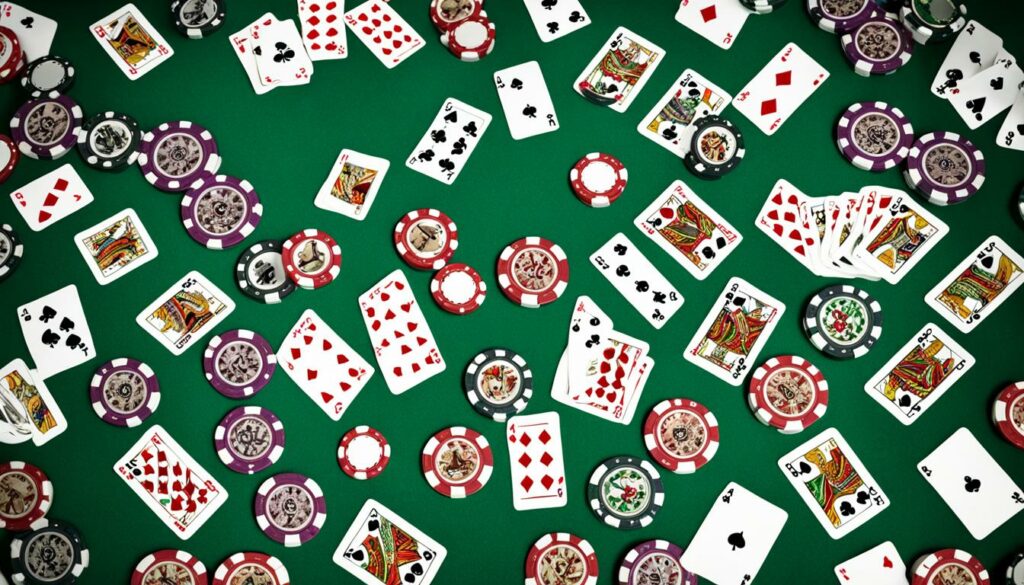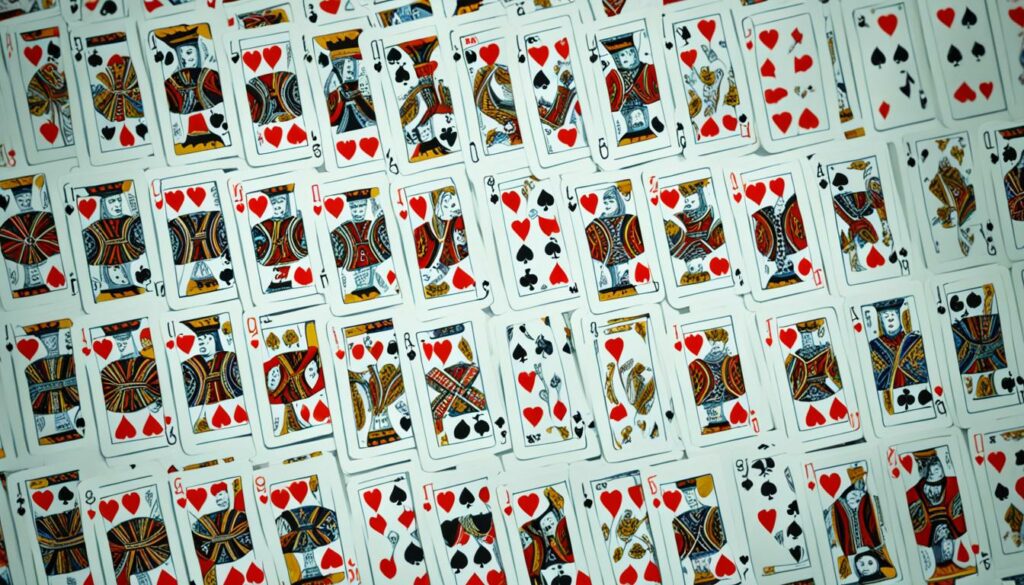Welcome to our comprehensive guide on poker rules in casinos. If you’ve ever wondered how poker is played in the thrilling atmosphere of a casino, you’ve come to the right place. In this section, we will provide you with a concise overview of the basic rules of poker that you need to know before stepping onto the casino floor.
Poker is a beloved card game that has captivated players around the world for generations. In casinos, the game takes on a new level of excitement as players challenge each other in hopes of winning big. Whether you’re a seasoned player or a complete novice, learning the rules of casino poker is essential to enhancing your gaming experience.
Understanding the fundamentals of poker is the first step towards becoming a skilled player. We will cover essential topics such as hand rankings, actions like betting, raising, and folding, and strategies to enhance your gameplay. By familiarizing yourself with these rules, you’ll be equipped to participate confidently in casino poker games.
Stay with us as we delve into the intricacies of casino poker gameplay, strategies, variations, and more. By the end of this guide, you’ll have a solid foundation and be ready to showcase your skills at the casino tables. Let’s get started!
Casino Poker Gameplay
When it comes to casino poker gameplay, players have a variety of actions they can take to navigate the game strategically. Understanding these actions is crucial to making informed decisions and increasing your chances of winning. Let’s explore some of the key gameplay elements in casino poker.
Betting: Betting is a fundamental aspect of casino poker. Players place their bets based on the strength of their cards or their perception of their opponents’ hands. The amount of the bet can vary depending on the specific game and table limits.
Raising: Raising is an action in which a player increases the current bet. This can be done to bluff opponents or to build a larger pot when holding a strong hand.
Folding: Folding is the act of discarding your hand and forfeiting your bets. Players may choose to fold if they believe their hand is weak or if they want to minimize potential losses.
Hand Rankings: Hand rankings are essential in casino poker. The rank of your hand determines its strength and the probability of winning. Knowing the hierarchy of hand rankings, from a high card to a royal flush, is crucial for making strategic decisions during gameplay.
Pot Odds: Pot odds refer to the ratio of the current pot size to the cost of a contemplated call. Understanding pot odds helps players determine whether it is mathematically sound to continue with a hand or fold, based on the potential payoff and the likelihood of success.
Combining these gameplay elements can lead to exciting and strategic experiences in casino poker. Mastering the art of betting, raising, folding, and recognizing hand rankings and pot odds will greatly enhance your chances of success at the poker table.
Pro Tip:
Always pay close attention to your opponents’ betting patterns and body language. This information can provide valuable insights into the strength of their hands and help you make more informed decisions during gameplay.
Casino Poker Strategies
Mastering casino poker strategies can significantly increase your chances of winning. With the right techniques, you can outsmart your opponents, make calculated decisions, and maximize your profits. In this section, we will explore some effective strategies and provide valuable tips to enhance your gameplay.
1. Bluffing
Bluffing is a tried and true technique that can give you an edge at the poker table. By making aggressive bets or raises with weak hands, you can deceive your opponents into folding strong hands, allowing you to take down pots without the best cards. However, bluffing should be strategic and calculated. It’s important to analyze your opponents’ playing styles and consider the board before attempting a bluff. Timing and consistency are key factors for a successful bluff.
2. Reading Opponents
Being able to read your opponents is crucial in casino poker. By observing their betting patterns, body language, and reactions, you can gain insight into the strength of their hands. Look for consistent behavior or sudden changes, as these can be indicators of their confidence or uncertainty. Additionally, pay attention to their table position, as this can affect their range of hands. Adapt your strategy accordingly to exploit their weaknesses and make informed decisions.
3. Bankroll Management
Proper bankroll management is essential for long-term success in casino poker. Set a budget and stick to it, ensuring that you only play with what you can afford to lose. It’s advisable to divide your bankroll into smaller units and only risk a fraction of it in each game. This helps to minimize losses during downswings and protects your overall bankroll. Additionally, avoid chasing losses by playing at higher stakes than your bankroll allows, as this can lead to further financial strain.
“Poker is a combination of luck and skill. The winner is the one who makes their own luck through skillful decision-making.”
4. Positional Play
Your position at the poker table can greatly influence your strategy. The later you act in a betting round, the more information you have about your opponents’ actions, allowing you to make more informed decisions. Take advantage of your position by playing a wider range of hands from late positions and being more cautious when in early positions. By leveraging positional play, you can increase your profitability and reduce the risk of making poor decisions.
5. Table Selection
Choosing the right table can significantly impact your profitability in casino poker. Look for tables with weaker players or higher average pot sizes, as these factors indicate potential profitability. Avoid tables with highly skilled players or aggressive opponents that can make your game more challenging. Conduct thorough observation before sitting down to ensure you’re in the most favorable environment to optimize your chances of success.
By incorporating these casino poker strategies into your gameplay, you can enhance your skills, make better decisions, and ultimately increase your chances of winning. Remember to practice regularly, analyze your own gameplay, and constantly adapt to the ever-changing dynamics of the poker table.

| Strategy | Description |
|---|---|
| Bluffing | Deceptively betting or raising with weak hands to make opponents fold strong hands. |
| Reading Opponents | Using observation and analysis to gain insight into opponents’ hand strengths. |
| Bankroll Management | Effectively managing your poker funds to minimize losses and ensure long-term sustainability. |
| Positional Play | Taking advantage of your position at the table to make more informed decisions. |
| Table Selection | Choosing the most favorable table with weaker opponents and higher potential profitability. |
Casino Poker Variations
When it comes to casino poker, there is a wide range of variations that players can enjoy. Each variation has its own set of rules and unique strategies, adding excitement and diversity to the game. In this section, we will explore some of the most popular casino poker variations and delve into the key differences that make them stand out. Whether you’re a seasoned player or new to the game, understanding these variations will enhance your overall poker experience.
Texas Hold’em
One of the most well-known and widely played casino poker variations is Texas Hold’em. In this game, players are dealt two private cards (hole cards) and five community cards. The goal is to create the best possible hand using a combination of the hole cards and the community cards. Texas Hold’em is known for its strategic gameplay, where players must decide when to bet, raise, or fold based on the strength of their hand and the actions of their opponents.
Omaha
Another popular variation is Omaha, which closely resembles Texas Hold’em but with a few twists. In Omaha, players are dealt four private cards and must use two of them in combination with three community cards to form their hand. This variation introduces more possibilities and higher hand rankings, making it a favorite among experienced players. The gameplay in Omaha requires careful consideration of the community cards and how they can benefit or hinder your hand.
Seven-Card Stud
Seven-Card Stud is a classic casino poker variation that was popular before the rise of Texas Hold’em. In this game, players start with two private cards and one face-up card. As the rounds progress, each player receives additional face-up cards, with the final card being dealt face-down. Unlike Texas Hold’em and Omaha, there are no community cards in Seven-Card Stud. Players must rely on their individual hand to make strategic decisions, including betting and folding at each stage of the game.
These are just a few examples of the many casino poker variations you can find in both online and land-based casinos. Each variation offers a unique playing experience and requires specific strategies to succeed. Whether you prefer the fast pace of Texas Hold’em, the complexity of Omaha, or the traditional charm of Seven-Card Stud, exploring different variations is a great way to enhance your poker skills and keep the game fresh and exciting.

| Variation | Number of Cards | Community Cards | Hand Combination |
|---|---|---|---|
| Texas Hold’em | 2 private cards + 5 community cards |
Yes | Best combination of hole and community cards |
| Omaha | 4 private cards + 5 community cards |
Yes | Best combination of 2 private and 3 community cards |
| Seven-Card Stud | 7 private cards | No | Best individual hand |
Poker Hands Ranking in Casinos
In casino poker games, understanding the hierarchy of poker hands is essential. By knowing how hands are ranked, players can make strategic decisions and assess their chances of winning. Let’s explore the different hand categories and their rankings.
The Poker Hand Categories
Poker hands are divided into several categories, each representing a different level of strength. Here are the main hand categories:
- High Card: This is the lowest-ranking hand, consisting of five cards that do not form any of the recognized hand combinations.
- One Pair: Two cards of the same rank, accompanied by three unmatched cards.
- Two Pair: Two sets of cards with the same rank, along with a fifth unmatched card.
- Three of a Kind: Three cards of the same rank, accompanied by two unmatched cards.
- Straight: Five consecutive cards of any suit.
- Flush: Five cards of the same suit, not in consecutive order.
- Full House: A combination of a three-of-a-kind and a pair.
- Four of a Kind: Four cards of the same rank, accompanied by one unmatched card.
- Straight Flush: Five consecutive cards of the same suit.
- Royal Flush: The best hand in poker, consisting of the Ace, King, Queen, Jack, and Ten of the same suit.
Ranking and Probabilities
The ranking of hands in poker determines the winner when multiple players have competing hands. It is crucial to understand the probabilities of getting each hand to make informed decisions during gameplay.
Here is an overview of the probabilities of obtaining different poker hands:
| Hand | Probability |
|---|---|
| High Card | 50.1177% |
| One Pair | 42.2569% |
| Two Pair | 4.7539% |
| Three of a Kind | 2.1128% |
| Straight | 0.3925% |
| Flush | 0.1965% |
| Full House | 0.1441% |
| Four of a Kind | 0.0240% |
| Straight Flush | 0.00139% |
| Royal Flush | 0.000154% |
These probabilities can guide players in assessing the strength of their hand and making strategic betting decisions.

Understanding the ranking of poker hands in casinos is fundamental to becoming a skilled player. By familiarizing yourself with the categories and probabilities, you can make informed decisions during gameplay. Now that we know how hands are ranked, let’s move on to the final section, where we’ll discuss poker tournaments and the importance of good etiquette.
Conclusion
In conclusion, understanding the rules, strategies, and variations of casino poker is essential for any player looking to improve their game. By familiarizing yourself with the basics of poker gameplay and the different hand rankings, you can make more informed decisions at the poker table.
Furthermore, practicing good etiquette is crucial in creating a positive and enjoyable poker atmosphere. Remember to be respectful to your fellow players and the dealer, avoid disruptive behavior, and follow the established rules of conduct.
For those seeking an extra level of excitement and competition, participating in casino poker tournaments can provide a thrilling experience. Tournaments offer the opportunity to showcase your skills against a field of talented players, with the chance to win significant prizes. To succeed in tournaments, it is vital to adapt your strategies and remain focused throughout the event.
Whether you’re a beginner or a seasoned player, casino poker offers endless possibilities for entertainment and challenge. By applying the knowledge gained from this article and continuously honing your skills, you can take your poker game to new heights and enhance your overall casino experience.
